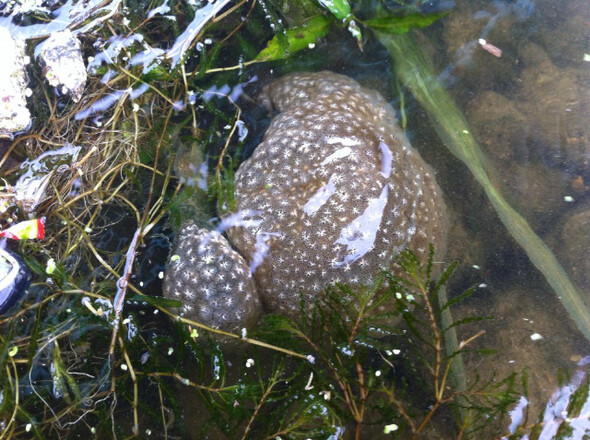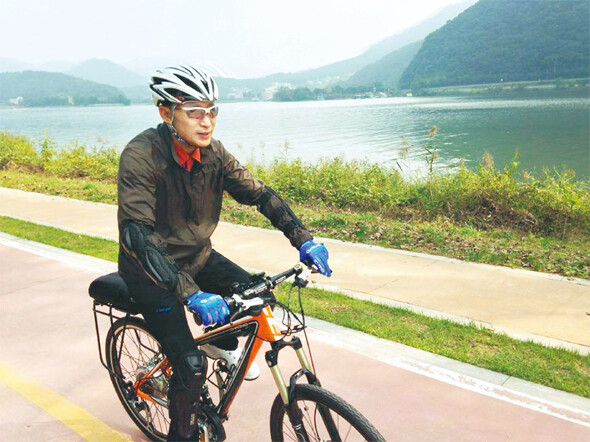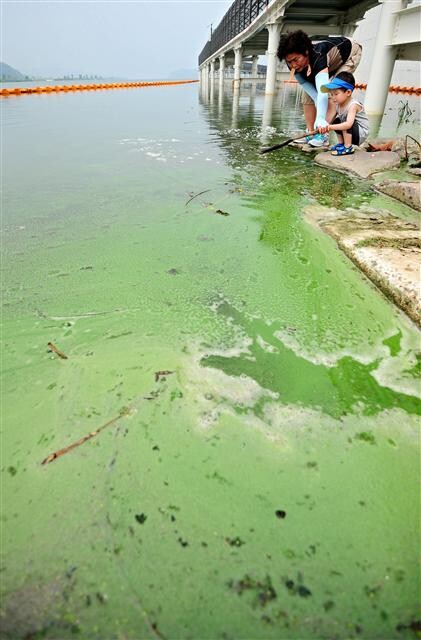hankyoreh
Links to other country sites 다른 나라 사이트 링크
Four Rivers evangelists now tight-lipped about disastrous project

By Kim Kyung-wook, Kim Jeong-su and Kim Kyu-won, staff reporters
Pervasive algal blooms and invasive bryozoans. Bedrock collapsing from excessive dredging. A mountain of debt for the Korea Water Resources Corporation (K-water). A host of problems are emerging with the Four Major Rivers Project, the massive effort pushed under the administration of former president Lee Myung-bak (2003-08). But the politicians, officials, and experts who pushed for the project, which started out as an idea for a “Grand Korean Waterway,” are showing no sign of regret or reflection.
Most of the major proponents of the project under the Lee administration were tight-lipped or evasive when the Hankyoreh contacted them on July 8 and 9. Some argued for waiting before coming to a final judgment on the project; others argued for channeling even more money into it.
A member of Lee’s camp said it was “jumping to conclusions” for environmental groups and NGO to demand responsibility for the disaster.
“There’s no strong evidence that the project has destroyed the ecosystem,” he said.
“Any general assessment of the Four Major Rivers Project needs to be made from a long-term perspective,” the official added.

Onetime Blue House Chief of Staff Yu Woo-ik, seen by many as the architect of the “Grand Korean Waterway” plan that would serve as the project’s basis, said he had “nothing to say about it right now.”
“I’m not speaking to the media,” Yu declared.
Yu, then a professor of geography at Seoul National University, drafted the waterway pledge while serving on Lee’s election team, and later backed it in its new form as the Four Major Rivers Project. The theoretical basis for the now-problematic project came mostly from him.
Also keeping quiet was Saenuri Party (NFP) lawmaker Lee Jae-oh, who earned the nickname “Four Rivers evangelist” after making a bicycle tour of the rivers during his stints as Anti-Corruption & Civil Rights Commission chief and Minister of Special Affairs under the Lee Myung-bak administration. Several phone calls made to hear his views on the project went unanswered. A secretary in his office said Lee’s “basic position is that some time is needed before we can judge the project’s success.”
Bahk Jae-wan, former Minister of Strategy and Finance who took charge of the project as Blue House senior secretary for state affairs planning, actually argued for expanding the project. Bahk, who lauded the project as a “Korean New Deal” during his time at the helm, insisted there was “no question” that water stores have increased and water quality has improved as a result of the project.
“The administration ought to be channeling more resources into expanding the project to the tributaries and streams,” he opined.
Bahk also shrugged off worries about the 8 trillion won (US$7.9 billion) in debt facing the K-water after the project.
“That can be solved with the profits from riverside development,” he said.
Meanwhile, some of the key officials who handled the more practical aspects of the project downplayed their own roles in it.
Shim Myung-pil, the former chief of the project’s office in the Ministry of Land, Infrastructure and Transport (the main government agency behind the effort), agreed with others on the need for “more time before we can make a fair assessment.”
But he also declined to say any more “because there could be misunderstandings if I talk about it in detail.”
Saenuri lawmaker Kim Hee-kuk, who served as deputy chief for the project headquarters, said he bore no legal responsibility as a public servant, but added, “It’s unfortunate that there have been problems that are being criticized.”
Two office chiefs, both surnamed Jeong, who supervised administration water resource policy at the time of the project each insisted that they had nothing to do with the project and advised speaking to other officials.

Former Vice Minister of Environment Lee Man-ui, who in the past said he would “take responsibility if the project turns out be a mistake,” responded that criticisms of the current problems with it were “politically motivated.”
Similar views were voiced by the experts who heartily approved of the project and offered rationales for the administration to go ahead with it.
One of them was Park Seok-soon, an environmental engineering professor at Ewha Womans University who advised Lee on his waterway pledge and headed the National Institute of Environment Research while the project was going on.
“I never did anything that I need to ‘take responsibility’ for, nor was I in a position to take responsibility,” Park said.
Cha Yoon-jung, a forest ecologist who helped promote the project as deputy chief of its environmental headquarters, was also tight-lipped.
“I don’t think now’s the time to be talking about it,” Cha said.
Environmental groups have demanded an exhaustive investigation of possible misdeeds, with punishments for those responsible. Their argument is that a project supported or actively pushed as “restoring the ecosystem and helping economic development” has actually resulted in greater damage to the ecosystem and the possibility of taxpayers facing a bill for billions of dollars.
“We keep seeing one problem after another with the Four Major Rivers Project, but the ones who spearheaded the effort all suddenly have no comment,” said Lee Cheol-jae, policy committee head for the Korean Federation For Environmental Movement. “They’re saying we should ‘wait before reaching any conclusions.’ It’s just irresponsible.”
“If we don’t hold people responsible for this crime against the natural environment, then we can expect to see even more of these ridiculous state projects,” Lee said.
In October 2013, the group MINBYUN-Lawyers of a Democratic Society and the Pan-National Committee for Restoration of the Four Major Rivers filed a criminal complaint with prosecutors on behalf of a list of 39,775 citizen complainants. It accused Lee, along with 57 other ministers and officials connected with the project, of breach of trust and abuse of authority.
Nine months later, the prosecutors have yet to even complete their scheduling for complainant questioning.
Please direct questions or comments to [english@hani.co.kr]
Editorial・opinion
![[Editorial] Intensifying US-China rivalry means Seoul must address uncertainty with Beijing sooner than later [Editorial] Intensifying US-China rivalry means Seoul must address uncertainty with Beijing sooner than later](https://flexible.img.hani.co.kr/flexible/normal/500/300/imgdb/original/2024/0517/8117159322045222.jpg) [Editorial] Intensifying US-China rivalry means Seoul must address uncertainty with Beijing sooner than later
[Editorial] Intensifying US-China rivalry means Seoul must address uncertainty with Beijing sooner than later![[Column] When ‘fairness’ means hate and violence [Column] When ‘fairness’ means hate and violence](https://flexible.img.hani.co.kr/flexible/normal/500/300/imgdb/original/2024/0516/7417158465908824.jpg) [Column] When ‘fairness’ means hate and violence
[Column] When ‘fairness’ means hate and violence- [Editorial] Yoon must stop abusing authority to shield himself from investigation
- [Column] US troop withdrawal from Korea could be the Acheson Line all over
- [Column] How to win back readers who’ve turned to YouTube for news
- [Column] Welcome to the president’s pity party
- [Editorial] Korea must respond firmly to Japan’s attempt to usurp Line
- [Editorial] Transfers of prosecutors investigating Korea’s first lady send chilling message
- [Column] Will Seoul’s ties with Moscow really recover on their own?
- [Column] Samsung’s ‘lost decade’ and Lee Jae-yong’s mismatched chopsticks
Most viewed articles
- 1Celine Song says she’s gratified global audiences have responded to the kismet of ‘inyeon’
- 2[Editorial] Transfers of prosecutors investigating Korea’s first lady send chilling message
- 3[Exclusive] Unearthed memo suggests Gwangju Uprising missing may have been cremated
- 4For new generation of Chinese artists, discontent is disobedience
- 5Xi, Putin ‘oppose acts of military intimidation’ against N. Korea by US in joint statement
- 6Highly educated high-earners at risk of being replaced by AI, BOK study says
- 7[Column] US troop withdrawal from Korea could be the Acheson Line all over
- 8USFK sprayed defoliant from 1955 to 1995, new testimony suggests
- 9Japan begins dumping irradiated Fukushima water amid outpouring of concern about vague timeline
- 10Why Kim Jong-un is scrapping the term ‘Day of the Sun’ and toning down fanfare for predecessors